Classroom resources for engaging young people
Be smart about your health resources are developed with and for lower secondary school teachers and students (13 to 15 year olds). They are free to use, optimised for teachers to access with a smartphone or laptop, (with or without a projector), and work both online and offline. They have been evaluated in randomised trials and shown to have a large, positive effect on students’ learning outcomes.
Explore "Be smart about your health"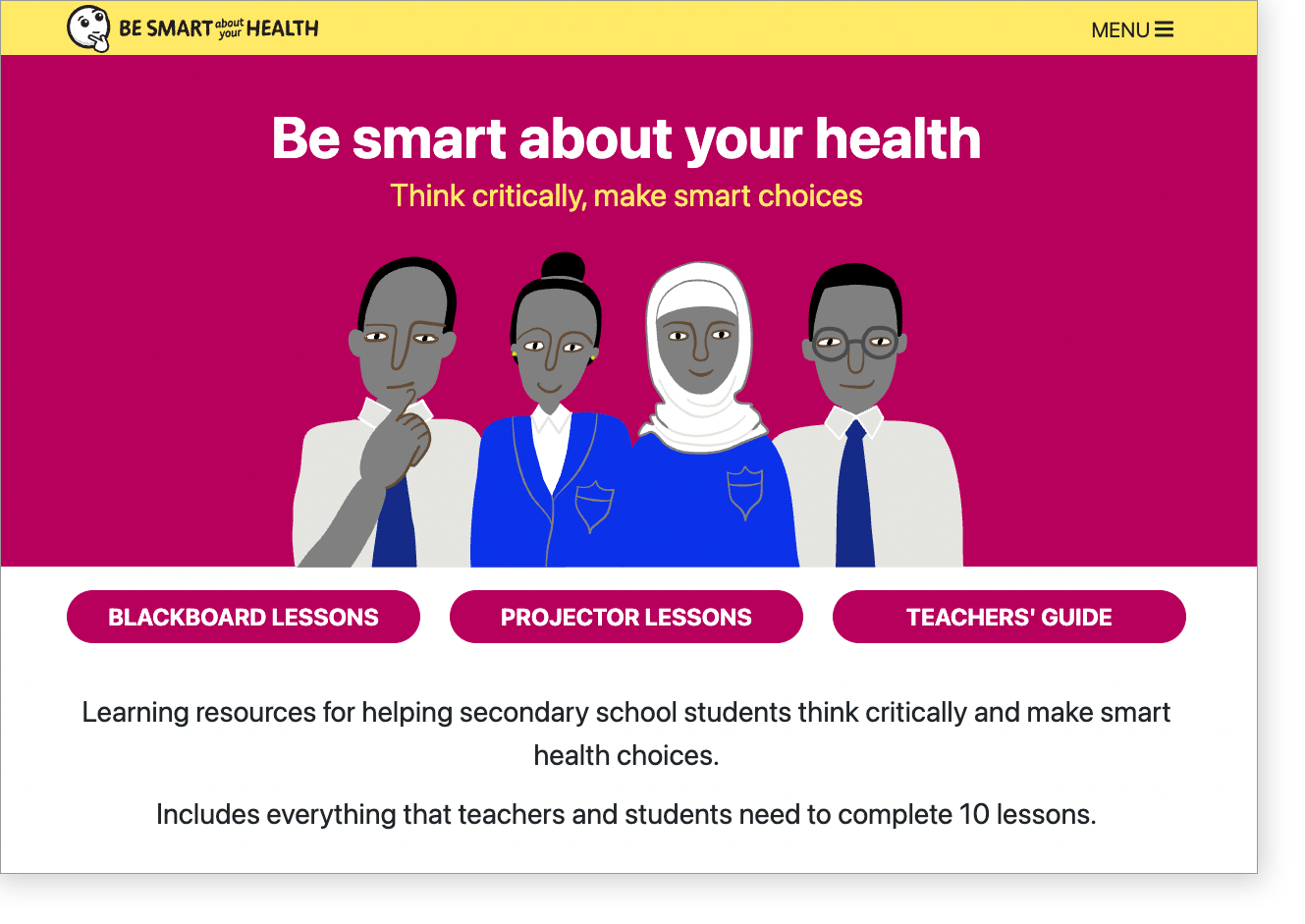
Includes 10 lessons
There are 10 classroom lessons designed to be taught in 40 minute sessions, focusing on one or more of the IHC Key Concepts.
Go to lesson overview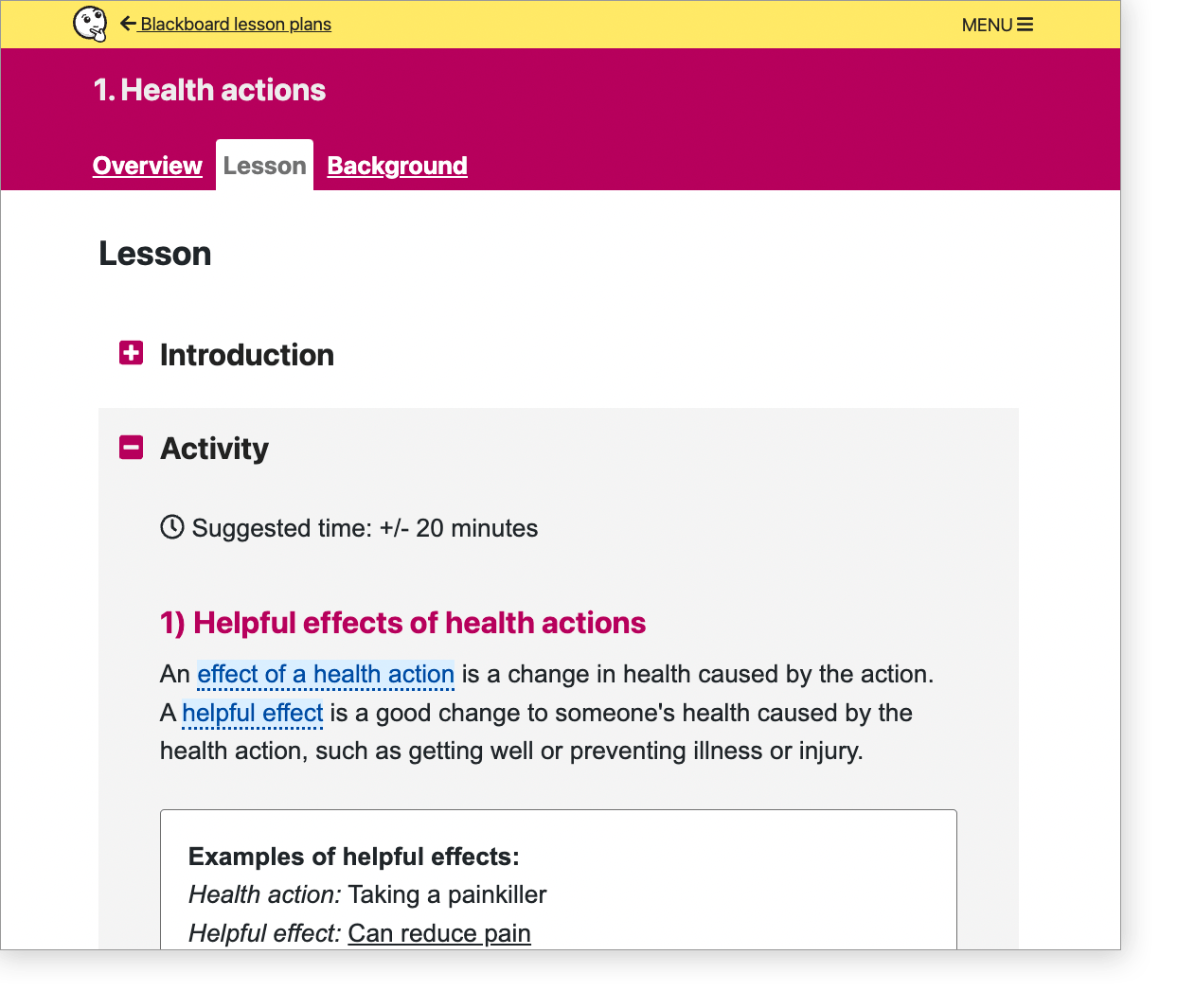
Blackboard lesson plans
“Blackboard lesson plans” are optimised for teachers’ use with a smart phone. They are created specifically to accommodate low-tech settings, with low file sizes and offline accessibility.
Go to blackboard lesson plans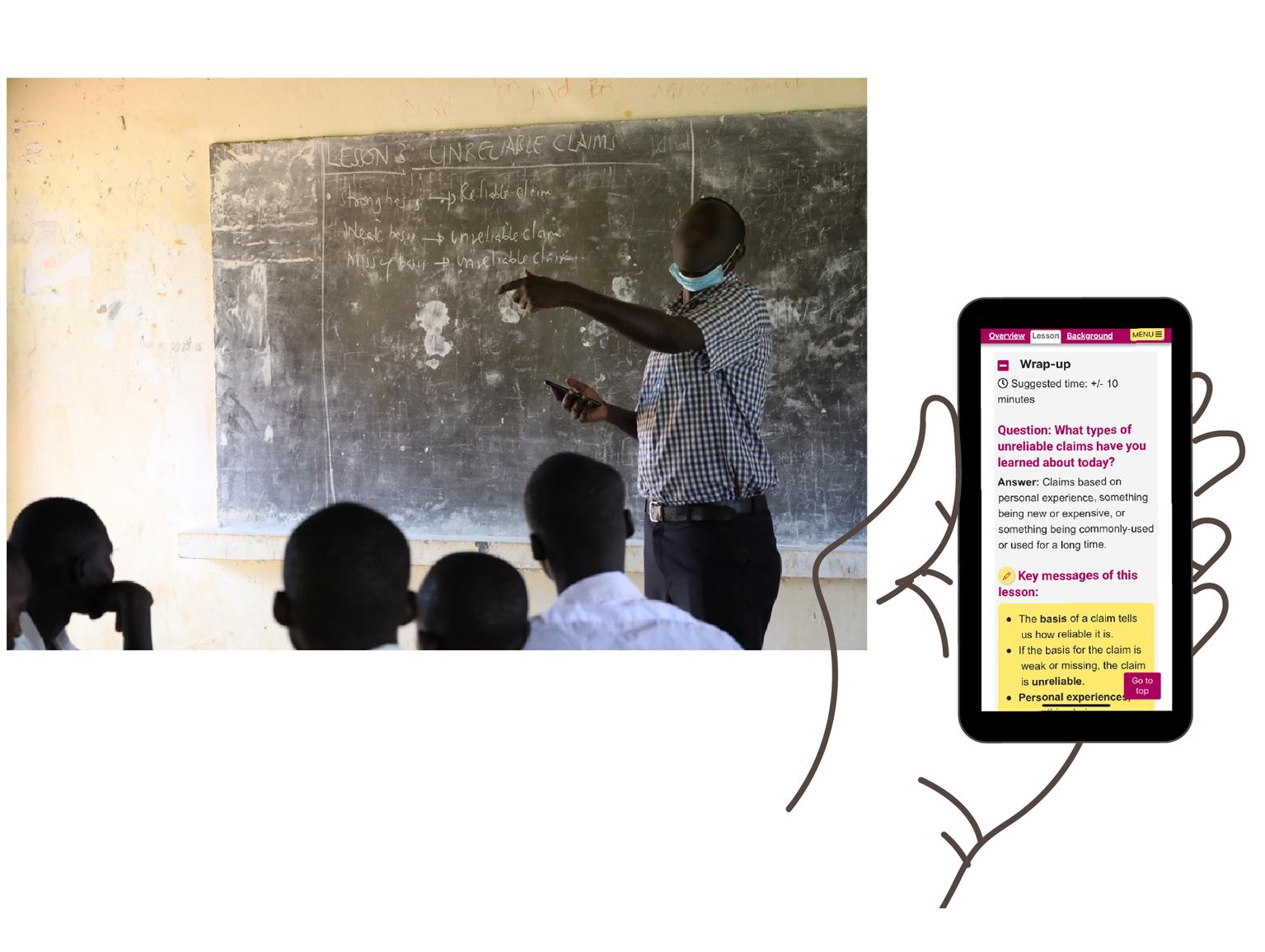
Projector lesson plans
For classrooms with access to a projector, “Projector lesson plans” include Google Slides presentations. These can be accessed directly online, or downloaded beforehand. Downloaded presentations can be easily modified by the teacher.
Go to projector lesson plans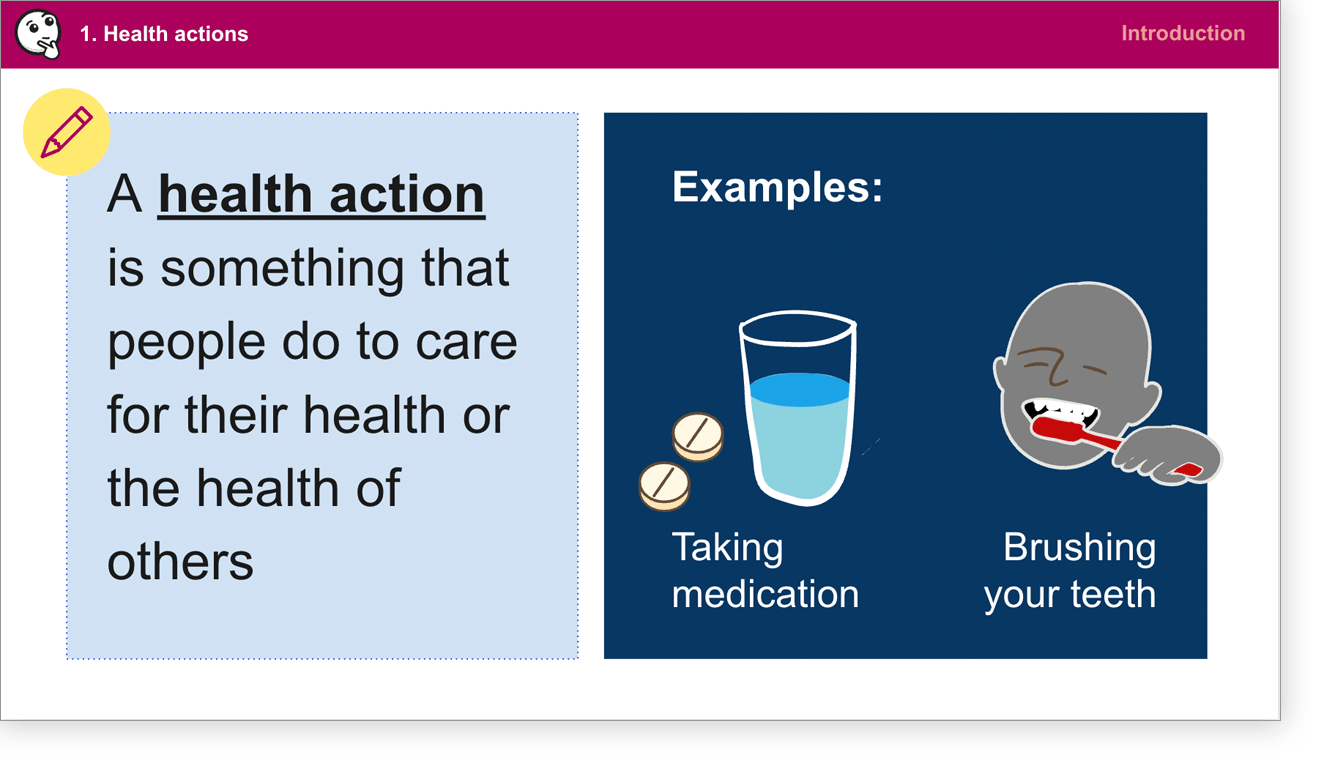
Teachers' guide
The Teachers’ guide includes everything teachers need to know about using the lessons plans, including introduction and overview, tips and in-depth descriptions, as well as links to other relevant resources.
Go to teachers' guide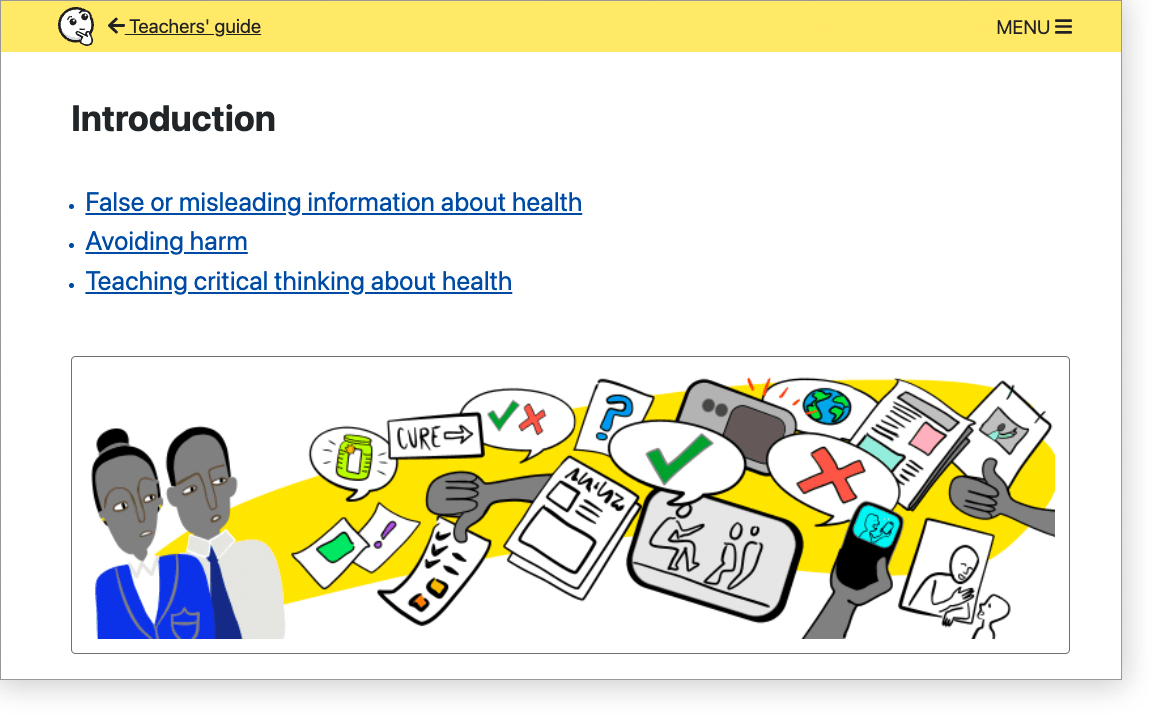
Printouts
Printouts are optional resources for teachers and students. They include Teacher summaries, Posters, and Student handouts for each lesson, as well as the Quizzes in lessons 5 and 10.
Go to printouts
Extra resources
The following materials are under the menu item “Extra resources”: Glossary, Examples of health actions, Printouts, Teacher training materials, Teaching strategies (PDF), and Underlying principles.
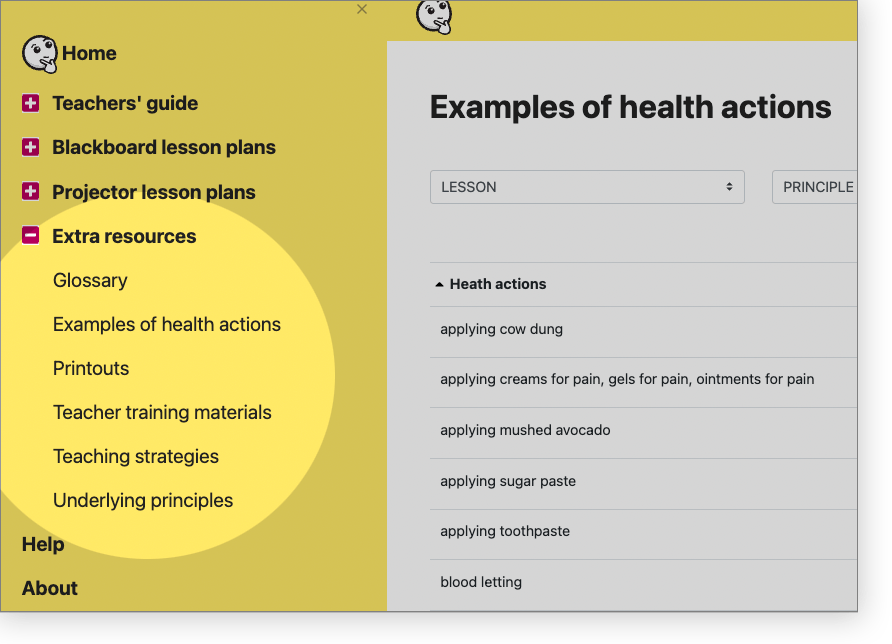
Teacher training materials
A comprehensive set of presentations for a teachers’ training workshop, covering in-depth introductions to the content and practical guidance for teaching the lessons.
Go to teacher training materials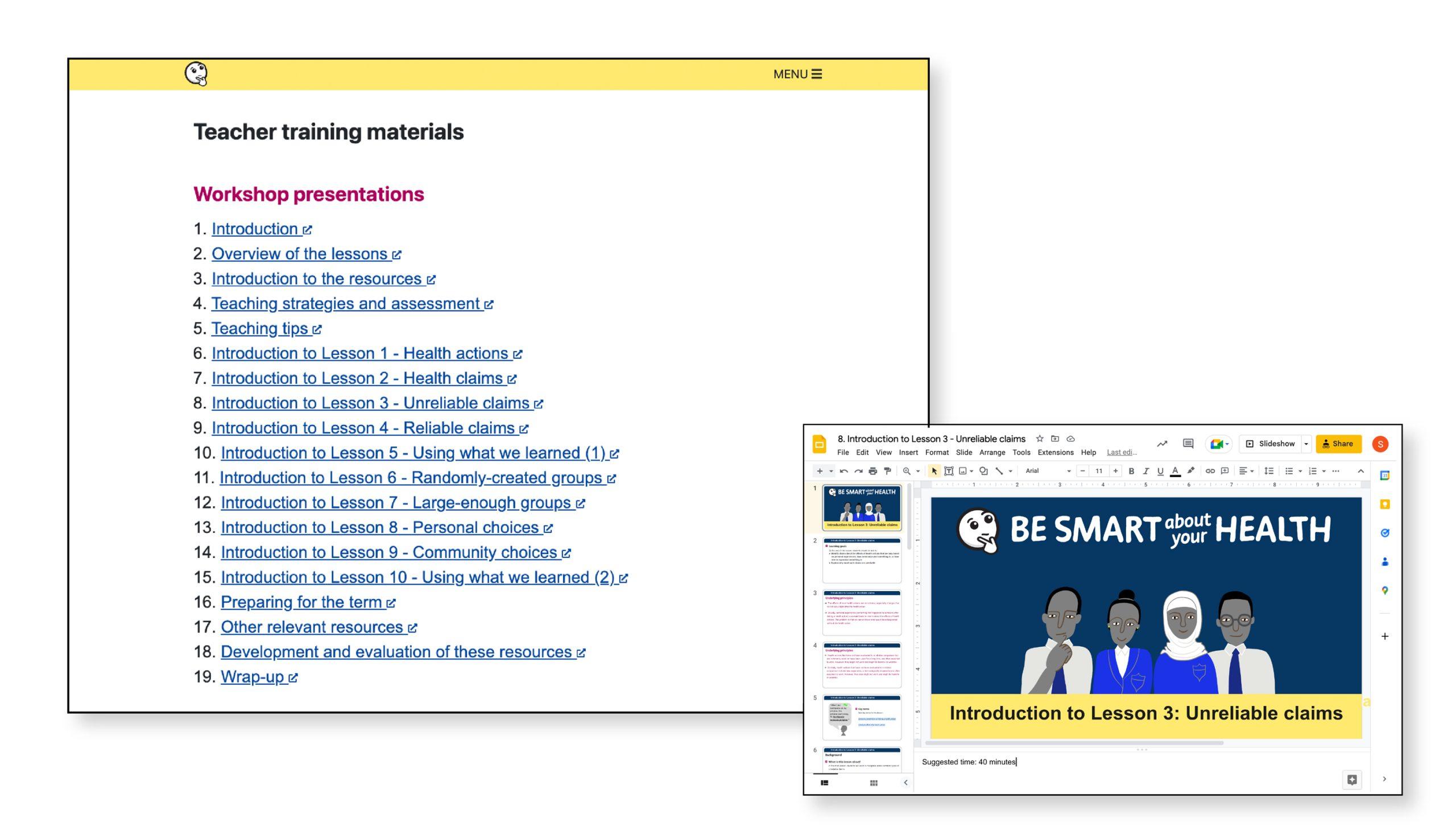
Anyone can use these resources for free.
We created them be easy to use in any setting. The learning goals are based on explicit, transparent principles for assessing health claims and thinking critically about choices (a set of IHC Key Concepts), and can therefore be mapped onto existing curricula. We’ve embedded examples of conditions and treatments that are relevant for young people in general, and added an Example collection so teachers can easily find other examples.
All IHC resources are free to adapt for non-commercial use under the following Creative Commons license: Attribution-NonCommercial-ShareAlike 4.0 International (CC BY-NC-SA 4.0)
Contact us if you want to produce an adaptation or translation.
We evaluated the effect of the resources in randomised trials in Kenya, Rwanda, and Uganda in 2022, and analysed the combined results from these three trials. The research shows that these resources demonstrated a clear effect on students ability to assess claims and use that knowledge to make informed choices.
Follow-up studies will explore students’ knowledge and experience after one year. We are also exploring transfer of learning, potential for adverse effects, and issues related to implementation and scaling up in process evaluations (manuscripts under development).
We developed these secondary school resources between 2019 and 2022, using a human-centred design approach with several cycles of prototyping, pilot testing and feedback from students, teachers, curriculum developers and other stakeholders in Kenya, Rwanda, and Uganda.
See video about how we work when developing resources.
The following 9 Key Concepts formed the basis of the Be Smart About Your Health resources for secondary schools:
Concepts about claims:
- Messages that ignore harms
- Messages that exaggerate effects
- Trust in personal experiences
- Belief that commonly-used means effective
- Belief that new is better
- Messages with no comparison
Concepts about evidence:
Concepts about choices:
In a structured process, we identified which Key Concepts were likely relevant and teachable to secondary school students. See: Prioritization of concepts for secondary school.
We developed and evaluated these educational resources for secondary school in a research project funded by the Norwegian Research Council (Project number 284683). See project overview: Enabling sustainable public engagement in improving health and health equity (CHOICE) – Overview
Research articles
Stakeholder engagement (pending, expected in late 2024)
Context analyses
Chesire F, Ochieng M, Mugisha M, Ssenyonga R, Oxman M, Nsangi A, et al. Contextualizing critical thinking about health using digital technology in secondary schools in Kenya: a qualitative analysis. Pilot Feasibility Stud. 2022;8(1):227. (See also protocol)
Ssenyonga R, Sewankambo NK, Mugagga SK, Nakyejwe E, Chesire F, Mugisha M, et al. Learning to think critically about health using digital technology in Ugandan lower secondary schools: a contextual analysis. PLoS One. 2022;17(2):e0260367.
Mugisha M, Uwitonze AM, Chesire F, Senyonga R, Oxman M, Nsangi A, et al. Teaching critical thinking about health using digital technology in lower secondary schools in Rwanda: A qualitative context analysis. PLoS One. 2021;16(3):e0248773.
Prioritisation of key concepts
Agaba JJ, Chesire F, Mugisha M, Nandi P, Njue J, Nsangi A, et al. Prioritisation of Informed Health Choices (IHC) Key Concepts to be included in lower-secondary school resources: a consensus study. PLoS One. 2023;18(4):e0267422. (See also protocol)
Teaching strategies
Oxman AD, Dahlgren A, Garcia Marti S, Kaseje M, Nsangi A, Rosenbaum S, et al. The effects of teaching strategies on learning to think critically in primary and secondary schools: protocol for an overview of systematic reviews. IHC Working Paper. 2019.
Development of the intervention (educational resources)
Rosenbaum S, Moberg J, Chesire F, Mugisha M, Ssenyonga R, et al. Teaching critical thinking about health information and choices in secondary schools: human-centred design of digital resources. F1000Research. 2023 May 11;12:481. (See also protocol)
Evaluation of the intervention
Chesire F, Kaseje M, Ochieng M, Ngatia B, Mugisha M, Ssenyonga R, et al. Effects of the informed health choices secondary school intervention on the ability of students in Kenya to think critically about health choices: A cluster-randomized trial. J Evid Based Med. 2023
Mugisha M, Nyirazinyoye L, Simbi CMC, Chesire F, Senyonga R, Oxman M, et al. Effects of the Informed Health Choices secondary school intervention on the ability of students in Rwanda to think critically about health choices: A cluster-randomized trial. J Evid Based Med. 2023
Ssenyonga R, Oxman AD, Nakyejwe E, Chesire F, Mugisha M, Nsangi A, et al. Use of the informed health choices educational intervention to improve secondary students’ ability to think critically about health interventions in Uganda: A cluster-randomized trial. J Evid Based Med. 2023
Chesire F, Mugisha M, Ssenyonga R, Rose CJ, Nsangi A, Kaseje M, et al. Effects of the Informed Health Choices secondary school intervention: A prospective meta-analysis. J Evid Based Med. 2023:1-11.
Process evaluations
Chesire F, Kaseje M, Ochieng M, Mugisha M, Ssenyonga R, Oxman M, et al. Effect of the Informed Health Choices digital secondary school resources on the ability of lower secondary students in Kenya to critically appraise health claims: protocol for a process evaluation. IHC Working Paper; 2022.
Mugisha M, Nyirazinyoye L, Oxman AD, Simbi CMC, Chesire F, Ssenyonga R, et al. Use of the Informed Health Choices digital resources for teaching lower secondary school students in Rwanda to think critically about health: protocol for a process evaluation. IHC Working Paper; 2022.
Ssenyonga R, Lewin S, Nakyejwe E, Nsangi A, Semakula D, Chesire F, et al. Informed heath choices intervention to teach secondary school adolescents in Uganda to assess claims about treatment effects: a process evaluation protocol. IHC Working Paper; 2022.
Adverse effects
Oxman M, Oxman AD, Fretheim A, Lewin S. Participants’ and investigators’ experiences and views of potential adverse effects of an educational intervention: Protocol for a qualitative evidence synthesis. IHC Working Paper. 2023.
Key concepts for informed health choices
Oxman AD, Chalmers I, Dahlgren A. Key Concepts for Informed Health Choices: a framework for enabling people to think critically about health claims (Version 2022). IHC Working Paper; 2022.
One-year follow-up (pending, expected in late 2024)
PhD theses (pending, expected in late 2024)
Final report (pending, coming March 2024)
